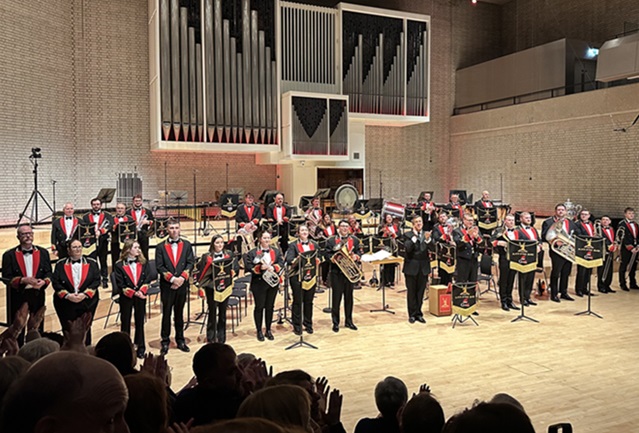

Conductor: Prof Nicholas Childs
Soloists: Siobhan Bates, Michael Cavanagh
RNCM International Brass Band Festival
Saturday 27th January
Classic English melodicism, complemented by a curio of ornate Polish virtuosity saw a supremely confident Black Dyke Band round off Saturday at the RNCM Festival.
The National Champion opened with the Tudor vistas of ‘Kenilworth’ – a somewhat conservative musical reimagining by Arthur Bliss of the visit of Queen Elizabeth I to the Warwickshire palace fortress in 1575.
By 1936, the composer was fast becoming part of the English musical establishment, his early enfant-terrible modernist experimentations replaced by the more lucrative middle-age certainties of film and stage.
Watercolour
Compared to the richly ingenious portraiture of ‘Pageantry’ by Herbert Howells, ‘Kenilworth’ is a pretty triptych watercolour, but an expertly constructed one, nonetheless. Prof Childs framed it with great respect and subtle authority, allowing it to retain its sense of imaginary historical perspective.
Philip Wilby’s humorous introduction to his ‘Concertante or Horn’ was gem of précised information – from anatomical Mozartian structure to making the choice between pianos once owned by either Bliss or HG Wells.
Philip Wilby’s humorous introduction to his ‘Concertante or Horn’ was gem of précised information – from anatomical Mozartian structure to making the choice between pianos once owned by either Bliss or HG Wells.
Siobhan Bates was the assured solo focal point, leading as well as playing off the ensemble and individual counterpoints in contrasting dance-like movements, each full of defined character.
Stephen Roberts’ Chopin inspired ‘Shades of the Soul’ was a ‘gem’ of a very different sort – a throwback almost to the virtuosic arrangements of James Ord Hume and Charles Godfrey that were played at the National Championships at the turn of the 20th century.
Greatest hits
It was a series of Chopin’s greatest ‘hits’; some of the most famous Nocturnes, (Opus 27, Nos 1 & 2), Etudes (Opus 10 Nos 3, Opus 25, No 10) and 'Grand Polonaise' linked together in a timeline of the composer’s short, turbulent life – one whose soul was indeed a kaleidoscopic spectrum of emotionally ornate twists and turns.
A life shorted by performance necessity came with Dr Robert Childs’ engaging arrangement of excerpts from the one act ballet ‘Adam Zero’. Arthur Bliss wrote the original 40-minute score as allegorical span of a man’s life through each of the four seasons – the premiere at Sadler’s Wells in 1946 greeted with critical acclaim.
Arthur Bliss wrote the original 40-minute score as allegorical span of a man’s life through each of the four seasons – the premiere at Sadler’s Wells in 1946 greeted with critical acclaim.
Only three movements were played here (topped and tailed by the short opening fanfare overture), but it certainly captured its theatrical characterisation. Rumours are that it could well be appearing in a contest format soon. It is well worth listening out for again.
Consummate
So too Michael Cavanagh who for the second year in a row gave a consummate display of musicianship – this time on Martin Ellerby’s ‘Baritone Concerto’. His ability to cut through with clarity and warm tonality brought the music to vibrant life.
A major work inspired by the most celebrated of English composers brought the evening to an end.
The MD commanded its direction and development at its core – the players in musical orbit around him, the antiphonal finale majestic and glorious.
Despite the somewhat distracting choreography, Oliver Waespi’s ‘Antiphonies on Themes by William Byrd’ retained a remarkable focus on detail, style, and above all, melodic tonality even when transforming with very modern twists of minor harmonic development.
The MD commanded its direction and development at its core – the players in musical orbit around him, the antiphonal finale majestic and glorious.
Iwan Fox









